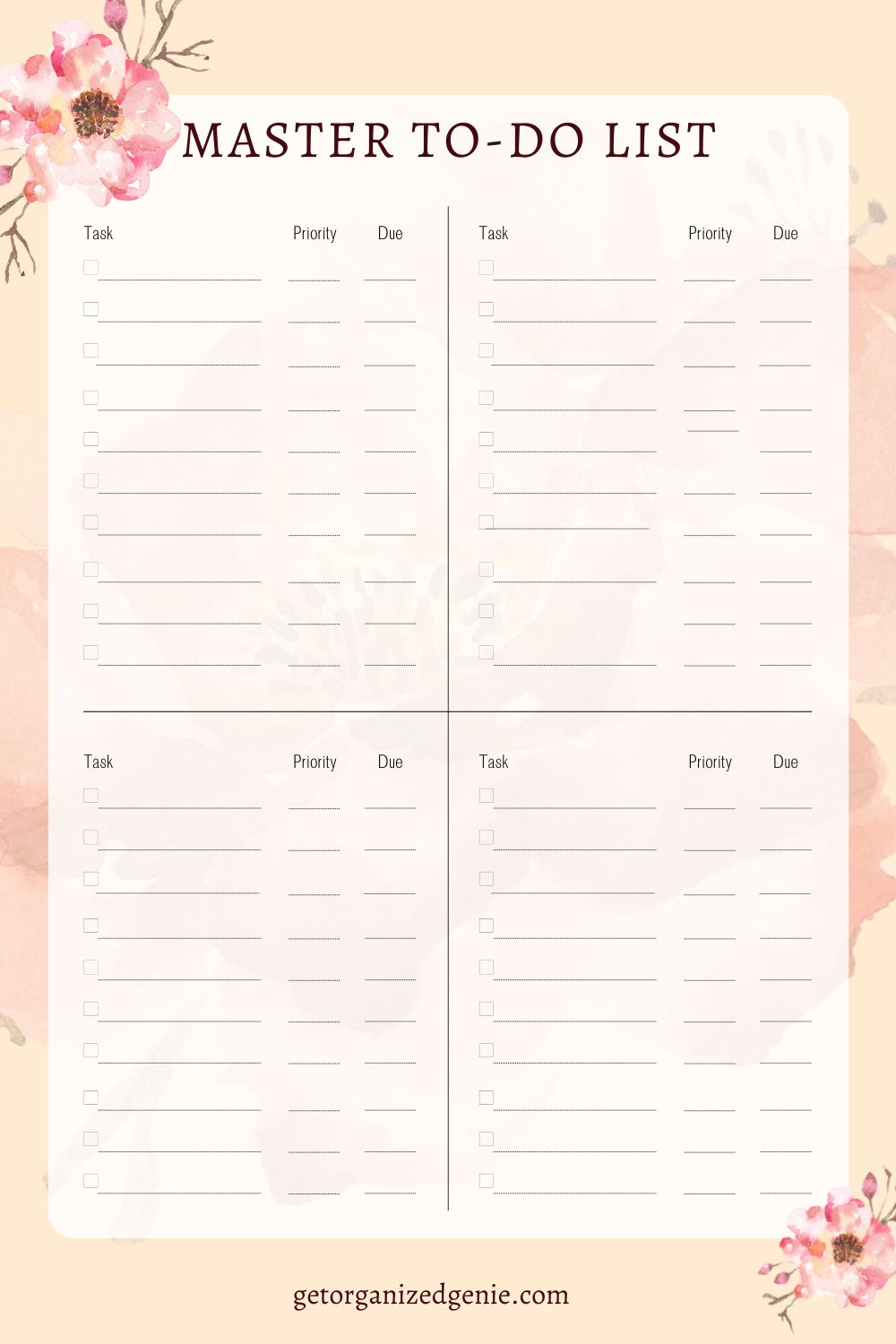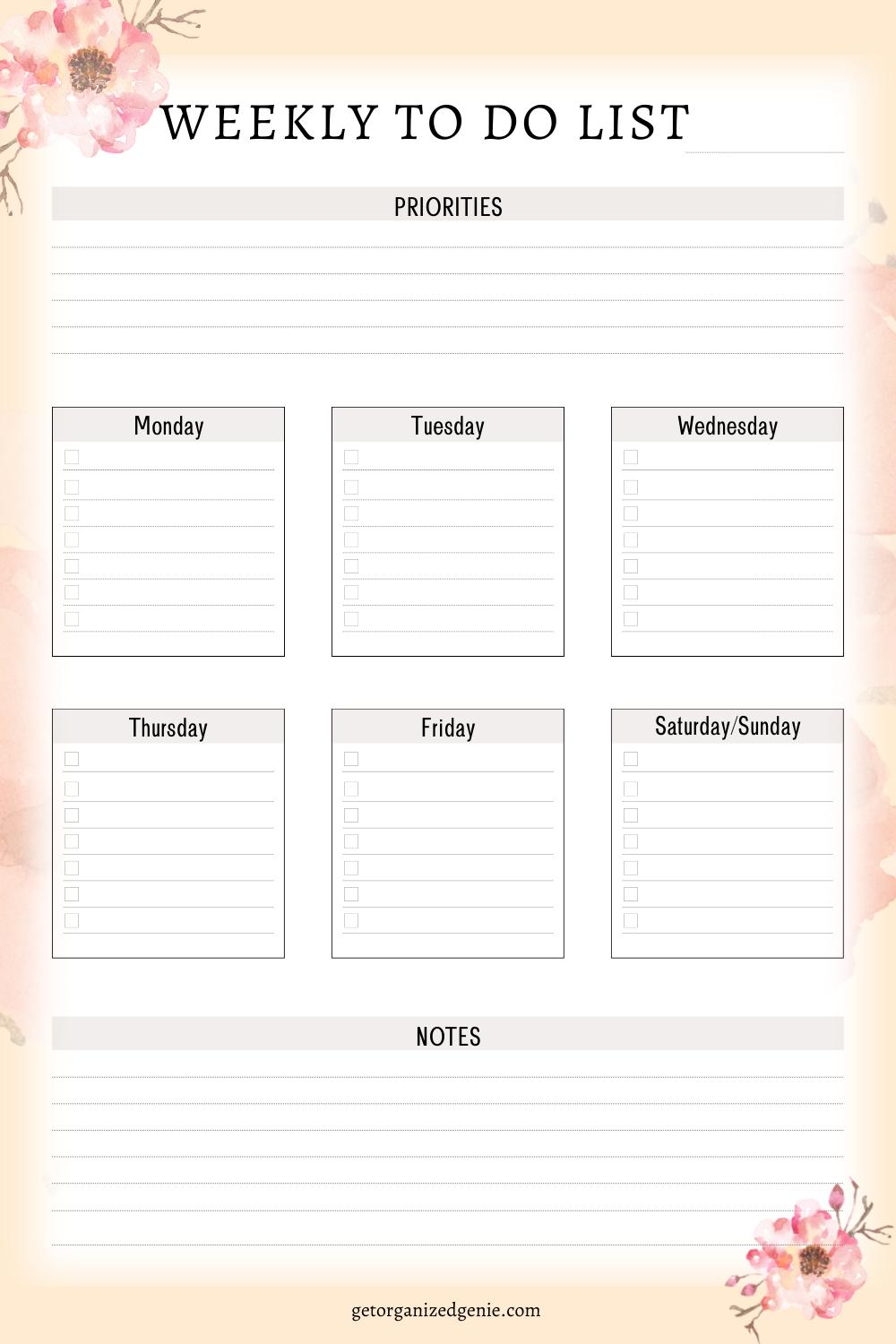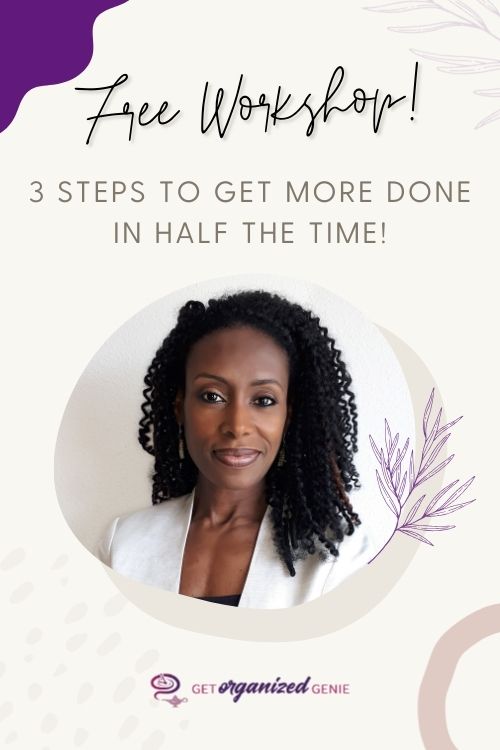- Home
- Habits of Organized People
12 Habits of Organized People That Will Transform Your Life
We can all learn and
benefit from adopting the habits of organized people, even if they don't come
naturally to us!
As you may already know, being organized has many advantages, to name a few:
- It makes us more productive and efficient.
- Life is less stressful.
- Setting priorities and getting things done is much easier.
- It enables us to spend more quality time with our family and friends, instead of being constantly bogged down with mundane tasks.
With a little effort and self-discipline, you too can learn and benefit from the habits of organized people.
This article summarizes some of the most common habits of organized people that you can easily incorporate into your daily life. Read on and give them a try!
Contents:

Common Habits of Organized People
Twelve of the most common
habits of organized people are described in the following paragraphs.
Start by practicing the
ones you feel most comfortable with and add more when you feel ready. Let's get
started...
1) Don’t Clutter Your Mind
Organized people note
things down as they come to mind, they don't overload their memories.
Implementing this simple habit of organized people will ensure that your ideas are always captured so you don't forget them. It will also reduce your mental load, freeing up your mind to focus on more important things.
As my best ideas usually come to me when I’m out and about, I find it most effective to use the notes app on my phone to jot them down quickly. Other people prefer to note things down on a notepad or a planner.
Whichever note system you decide to use, be
consistent and use the same one all the time.
Avoid using bits of paper, which can get lost.
2) Make Effective Use of
Lists
Another of the common habits
of organized people is their use of lists. They use task lists or to-do lists
to note down daily tasks and long-term projects.
I always use a Master Task List to note all of my pending tasks. It gives me a clear picture of everything I need to get done and makes it easier for me to organize and prioritize my workload.
Here’s an easy-to-use Master Task List Template. Click on the link to download and use it to note all of the tasks you’d like to get done at some point in the future.
Set priorities for each of
the tasks you’ve listed and address each task at an appropriate time. Enjoy the
sense of achievement you feel when you check completed tasks off your task list. This will help you stay motivated to do more!
I also use lists for routine activities and when preparing for important events. Here are a few examples of lists that I typically use to ensure that I don’t forget a thing:
- Shopping lists.
- Items to be packed for a holiday or business trip.
- Essential items for an event.
- Issues that need to be addressed during a meeting or phone call.
3) Use Calendars
Organized people normally
use a calendar to note upcoming events, commitments, deadlines, and other planned
activities. They check their calendar
regularly so that they always know what's coming up and to make sure they don't
double-book themselves.
Some organized families even sync their calendars with other family members to make it easier to coordinate family events.
Using a calendar is one of the most beneficial
habits of organized people. If you tend to forget commitments, try using
one. It’s a quick and easy way to check your availability and it
simplifies planning ahead.
4) Plan Ahead
Organized people set goals and plan ahead. They are
conscious of the time it takes to do things and plan accordingly.
Consider adopting the following habits of organized people to make planning easier and to ensure that you get things done:
- Review your Master To-Do List and decide which tasks you need to address, prioritizing important or urgent tasks.
- Use a planner to organize your tasks. You can download an easy-to-use weekly to-do list planner by clicking on the link.
- When using your weekly planner, first consult your calendar to check for previously scheduled appointments and commitments. Note these on your weekly planner.
- Organize the tasks you've selected from your Master To-Do List on your planner, ensuring that high-priority tasks are addressed first.
- Always leave some margin when planning ahead to cater to the unexpected.
- Check
your planner regularly to ensure that you stay on track.
5) Keep Your Surroundings Organized
Organized people make a
conscious effort to keep the space around them tidy and well organized, whether
it's their office, home, garage, phone, or laptop.
All of their possessions have a "home", they know where things are kept and they can quickly access the things they need without wasting valuable time searching.
Working in an organized environment saves time and helps to keep you focused so that you can get more stuff done.
To put this habit into action, consider participating in our Spring Cleaning Challenge, a structured four-week program designed to help you declutter and refresh your space, mind, and goals.
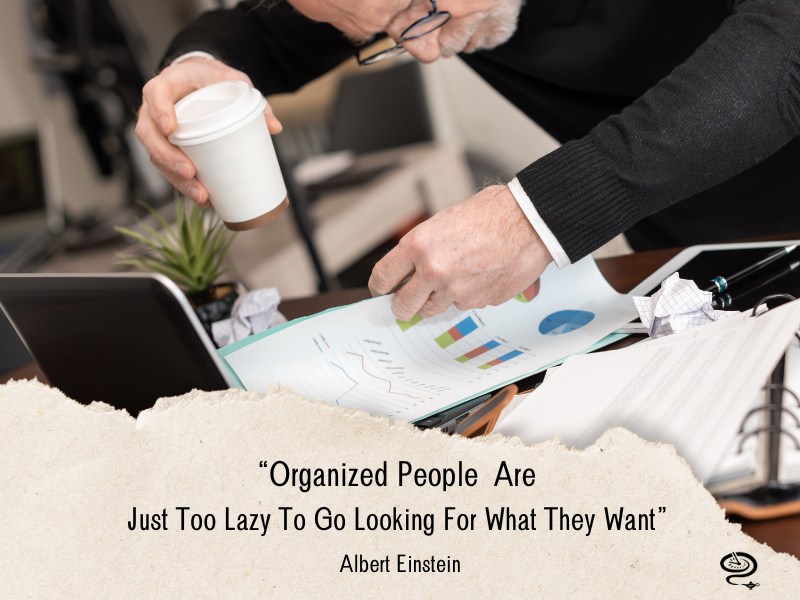
6) Be Self-Disciplined
Exercising self-discipline
is another of the key habits of organized people. It takes motivation and discipline to stick to
doing things in an organized fashion, especially when you're tired or just not
in the mood.
Being self-disciplined also helps you to feel in control and makes it far more likely that you will achieve your goals.
If self-discipline doesn't come naturally to you, it can be learned.
The book "Power of
Discipline: How to Use Self Control and Mental Toughness to Achieve Your
Goals" by Daniel Walter provides interesting tips on self-discipline.
7) Follow Regular Routines
Following routines is
another of the common habits of organized people. Routines save them time and
effort as doing things becomes automatic.
Here are a few routine activities that have simplified my life and helped reduce stress and overwhelm. Give them a try, I’m sure they’ll help you too:
- If you're always pushed for time when getting ready for work in the mornings, consider preparing your work clothes, handbag, and healthy snacks the night before. The morning rush will become a breeze!
- Plan your meals each week and batch cook in advance so you don’t have to cook every day. Include dishes that can be frozen to give you flexibility during busy periods.
- Set aside around half an hour each day for physical exercise.
Don't forget to include time for planning and organizing in your daily routine:
- Check your calendar daily and plan for the upcoming day in advance. You can do this at the end of the previous day or first thing in the morning.
- At the end of the working day, leave your desk organized and ready for action the next day.
- Before settling down to relax at home, check each room to make sure that everything is in its proper place.
Read more about the benefits of having a routine and how to build a routine.
8) Don’t Procrastinate
Organized people
generally don’t procrastinate, they
address things straight away. This doesn’t necessarily mean that they do
everything immediately, they note pending tasks on their do-to list or directly
into their calendar or planner to address them at an appropriate
time.
Do you often put things off?
According to David Allen, a world-leading expert on personal and organizational productivity, a useful guideline to follow is that if a task can be completed in under 2 minutes, it should be tackled immediately(1).
Another great strategy to avoid procrastination is to use the Eat That Frog Method. Click on the link to find out more!
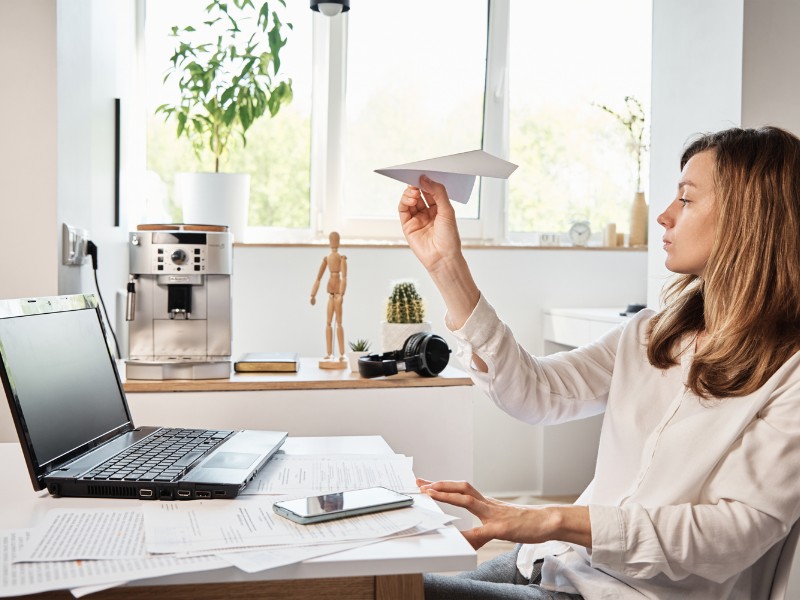
9) Delegate Appropriately
Organized people are fully
aware of their strengths and weakness and delegate accordingly. This is one of
the essential habits of organized people that can help you to avoid becoming
overloaded and stressed.
Learn to value your time and efforts!
If a task is going to take
you hours to do when someone else can do it in a fraction of the time, delegate
the task. Your time and energy are better spent on more important tasks.
10) Stay Focused
Organized people avoid
distractions and stay focused on their goals until they achieve them.
Get into the habit of
staying focused on your goals and the tasks at hand until they are complete.
Don't leave things unfinished!

11) Always Be Prepared
Organized people are always
prepared to tackle whatever comes their way!
They think ahead, considering what essentials they may need and ensuring that they can access them easily when necessary.
This has helped me enormously on both a personal and professional level and I’m sure that it will help you too.
Here are a few examples that I’ve found particularly useful:
Meetings:
- Before meetings, review the meeting agenda and any relevant documentation.
- Use a digital or paper folder to organize the meeting documents and make sure you can access them easily during the meeting.
- Take a pen and paper or your laptop to note down any important issues raised during the meeting.
Trips and Excursions:
- Think about what activities you’ll be doing during the trip and make a note of what you’ll need.
- Gather together all the items you’ve noted.
- When traveling with young children, be sure to take water, snacks, tissues, wet wipes, or even plasters. Keep these items in your bag or in the car so you can easily access them if you need to.
Thinking ahead and being prepared is beneficial to all aspects of our lives. It saves time, and money and also helps avoid unnecessary stress or embarrassment, especially when faced with the unexpected.
It also portrays a professional image that can
make you stand out from the rest!
12) Keep on Top of Things
Organized people like to
stay on top of things, they don’t let things get out of control. They ensure
that important appointments aren’t missed, that bills are paid on time, they
address correspondence promptly and use or renew things before they expire.
Keeping your affairs under control saves you time and money. You are also far less likely to become stressed or overwhelmed by having to sort things out at the last minute.
Imagine what would happen if you were to forget an important appointment or meeting, or if you don't make a scheduled payment on time. The consequences can cause you far more hassle than it's worth.
The following habits of organized people are my favorites and I can assure you that they’ll help you keep your affairs in check:
- Check your email and post correspondence daily. This keeps you informed of issues that may impact you and allows you to decide when best to address them.
- Check your calendar daily to ensure that important appointments or events aren’t missed.
- Review your to-do list regularly. Try to address at least one item on your to-do list each day. If you manage to do more than one…even better!
- Don’t leave things to the last minute, give yourself plenty of time to get things done!
BOTTOM LINE
Reap the benefits of an organized life by adopting some of the habits of organized to people:
- Note things down to ensure they aren't forgotten.
- Use a calendar or planner to plan ahead and get things done.
- Keep your surroundings organized to save time and boost productivity.
- Stay on top of your affairs and always be prepared to tackle whatever comes your way!
Get started TODAY and stick with it. I can assure you that you won't regret it!
Popular Articles
Check out these articles to help you stay organized and productive.
- Organize Your Life and Make More Time for YOU!
- How to Organize Your Life in 3 Easy Steps!
- Getting Organized at Work - 4 Essential Tips for Success
- Tips for Organizing Your Home in 4 Easy Steps
- FREE Printables to Organize Your Life
References
- Getting Things Done, the art of stress-free productivity by David Allen.
Share this with others by clicking the icons below!
